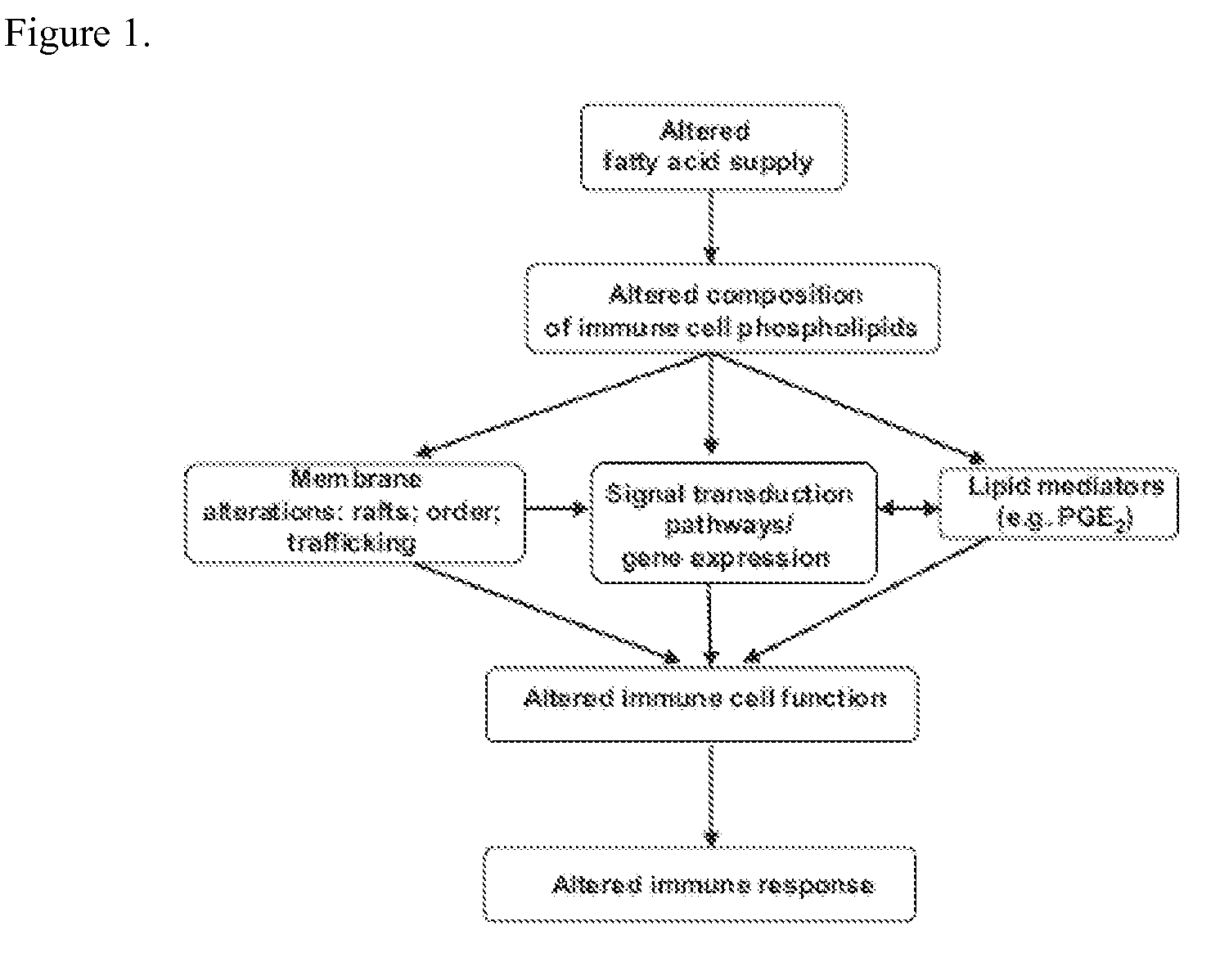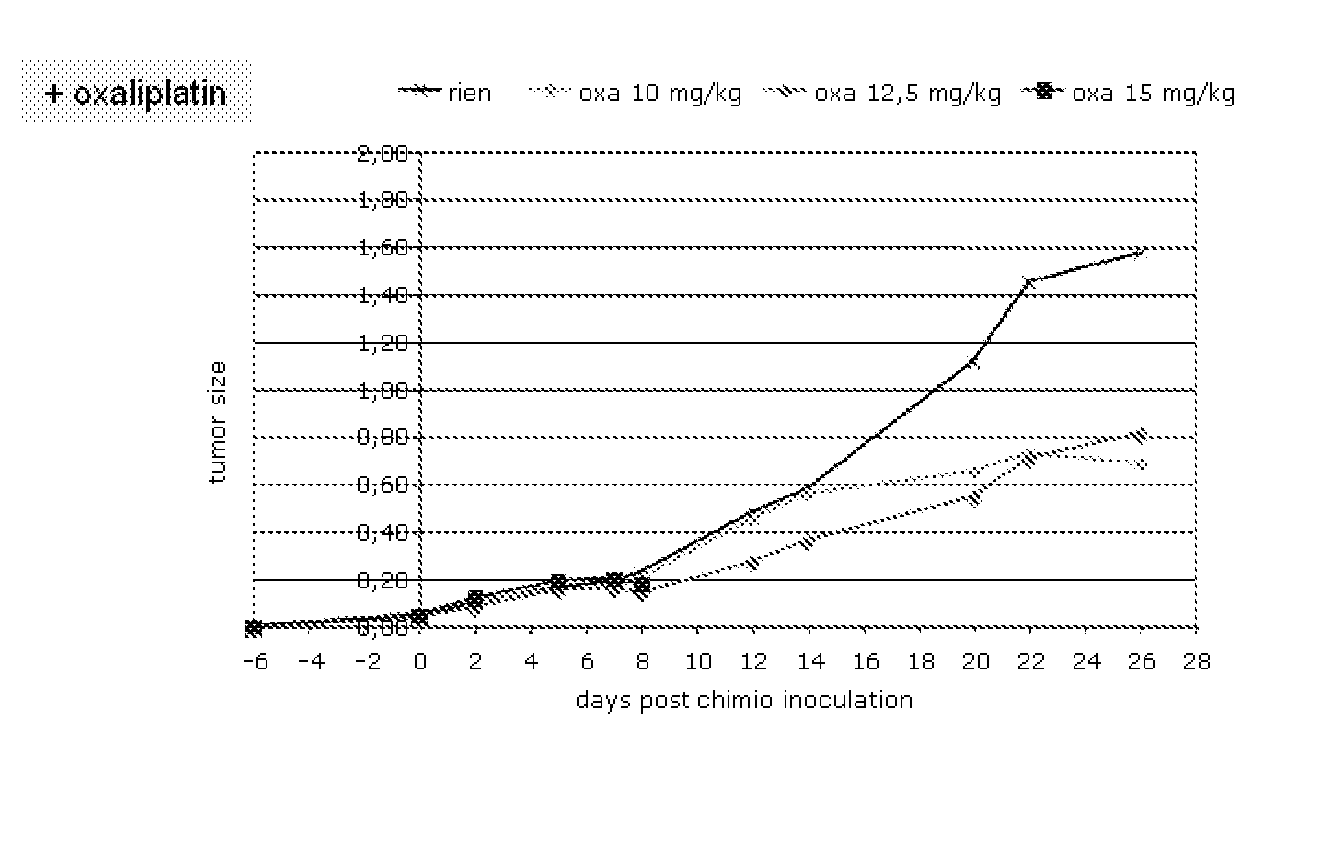Nutritional support to prevent and/or mitigate bone marrow toxicity from a cancerous tumor
a cancerous tumor and immunonutritional composition technology, applied in the field of nutritional support to prevent and/or mitigate bone marrow toxicity, can solve the problems of affecting the immune system, affecting the anti-tumor immune response, and affecting the ability of the immune system to control the presence and overgrowth of transformed tumoral cells, so as to preserve cell viability and activate the
- Summary
- Abstract
- Description
- Claims
- Application Information
AI Technical Summary
Benefits of technology
Problems solved by technology
Method used
Image
Examples
example 1
[0161]Presence of Immune-Suppressor Mechanisms in Tumor-Bearing Animals—Impairment of Innate and Adaptive Immune Response.
[0162]Mice. Inbred eight-week-old C57BL / 6 (H-2b) mice were used in the experiments. Mice were inoculated subcutaneously (s.c.) on the left flank with 1×10 6 tumor cells, and tumor growth was monitored every 2 days by caliper measurement. 6 days after the tumor inoculation the animals were treated either with oxaliplatin or doxorubicin. Tumor growth was monitored every two days after the chemotherapeutic treatment and they were sacrificed after two weeks of tumor implantation. Some experiments were carried out until 28 days post-chemo to better assess tumor growth.
[0163]Body weight was assessed every two days until sacrifice.
[0164]Blood samples were obtained at day 2 and 4 after the chemo-treatment, at day 10 and at sacrifice (14 or 28 days). An autopsy was performed and tumoral mass was assessed.
[0165]Cancer Cell Lines. Methylcholanthrene (MCA) induced sarcoma ce...
example 2
[0180]Presence of Immune-Suppressor Cell Mechanisms in Tumor-Bearing Animals Undergoing Chemotherapy. Status of the Innate and Adaptive Immune Response.
[0181]Mice. Inbred eight-week-old C57BL / 6 (H-2b) mice were used in the experiments. The animals were distributed into 7 different group diets. There was a control group that received the diet AIN 93 for adult rodents (maintenance). Test diets were administered in doses appropriate to the animal model: (a) Ctrl diet were supplemented with 1% (w / w) L-arginine, (b) 25% of the protein was replaced by glutamine, (c) 1% (w / w) L-citrulline, (d) 1 g / Kg body weight with active hexose correlated compound, (e) 20 mg / day of RNA nucleotides and (f) 25 mg / day of lactoferrin. One week later mice were inoculated subcutaneously (s.c.) on the left flank with MCA-OVA 1×106 tumor cells, and tumor growth was monitored every two days by caliper measurement. Six days after the tumor inoculation the animals were treated either with oxaliplatin or doxorubici...
example 3
[0193]Presence of Immune-Suppressor Mechanisms in Tumor-Bearing Animals Undergoing Chemotherapy Can Be Partially Compensated by Specifically Designed Immunonutrition.
[0194]Mice. Eight-week-old C57BL / 6 mice were used in the experiments. Mice were inoculated s.c. on the left flank with tumor cells, and tumor growth was monitored every 2 days by caliper measurement. An autopsy was performed between 10 and 20 days of tumor implantation and tumoral mass was assessed. Cell tumors were evaluated for the frequency of cells undergoing apoptosis, mitosis and cells going through cell cycle (Ki 67 immunohistochemical staining) Ten days after tumor implantation animals were treated with chemotherapeutic agents. The experimental animals were given 4 weekly intraperitoneal (i.p.) injections of the following drugs, individually or in combination: Cytoxan (cyclophosphamide monohydrate), 100 mg / kg; methotrexate, RNX-0396, 25 or 50 mg / kg; Adriamycin (doxorubicin hydrochloride.), 5 mg / kg; 5-FUra, 4, 25...
PUM
| Property | Measurement | Unit |
|---|---|---|
| temperatures | aaaaa | aaaaa |
| molecular weight | aaaaa | aaaaa |
| time | aaaaa | aaaaa |
Abstract
Description
Claims
Application Information
 Login to View More
Login to View More - R&D
- Intellectual Property
- Life Sciences
- Materials
- Tech Scout
- Unparalleled Data Quality
- Higher Quality Content
- 60% Fewer Hallucinations
Browse by: Latest US Patents, China's latest patents, Technical Efficacy Thesaurus, Application Domain, Technology Topic, Popular Technical Reports.
© 2025 PatSnap. All rights reserved.Legal|Privacy policy|Modern Slavery Act Transparency Statement|Sitemap|About US| Contact US: help@patsnap.com



